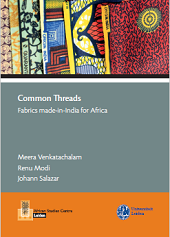Common Threads: Fabrics Made-in-India for Africa
 Common Threads explores the ties that bind India and Africa through the material medium of cloth, from antiquity to the present. Cloth made in India has been sold across African markets for millennia, by Indian, African, and European traders. The history of this trade offers perspectives into the rich stories of bi-directorial migrations of peoples, across the Indian Ocean, the exchange of visual aesthetics, and the co-production of cultures in the two geographies. Common Threads uses photographs to tell the story of the creation of these textiles in India, which today is concentrated in the small town of Jetpur in the Rajkot district of Gujarat. It sheds light on the artists and the agencies in India that are involved in the design, production, and logistics of this enterprise. Most significantly, it highlights the role of African consumers in defining the evolution of these genres of fabric, and the centrality of people-to-people connections in sustaining the continued cosmopolitanism of these transoceanic connectivities.
Common Threads explores the ties that bind India and Africa through the material medium of cloth, from antiquity to the present. Cloth made in India has been sold across African markets for millennia, by Indian, African, and European traders. The history of this trade offers perspectives into the rich stories of bi-directorial migrations of peoples, across the Indian Ocean, the exchange of visual aesthetics, and the co-production of cultures in the two geographies. Common Threads uses photographs to tell the story of the creation of these textiles in India, which today is concentrated in the small town of Jetpur in the Rajkot district of Gujarat. It sheds light on the artists and the agencies in India that are involved in the design, production, and logistics of this enterprise. Most significantly, it highlights the role of African consumers in defining the evolution of these genres of fabric, and the centrality of people-to-people connections in sustaining the continued cosmopolitanism of these transoceanic connectivities.
This book has been published in the African Studies Collection as volume 76.
Read the full text.
Read the interview with co-editor Meera Venkatachalam by Voertaal.
Also watch the documentary Common threads: Fabrics made-in-India for Africa:
Author(s) / editor(s)
About the author(s) / editor(s)
 Meera Venkatachalam is an anthropologist and historian. Her work focuses on West Africa, Indian Ocean connectivities, and Africans in India.
Meera Venkatachalam is an anthropologist and historian. Her work focuses on West Africa, Indian Ocean connectivities, and Africans in India.

Renu Modi is Professor and former Director of the Centre for African Studies, University of Mumbai. Her research interests are interdisciplinary and cross-cut; International Relations, Global Studies, and Indian Ocean Studies.

Johann Salazar is an independent researcher and photographer with a background in Sociology and Anthropology.His current interests include visual storytelling, science communication, and issues of identity and belonging.

